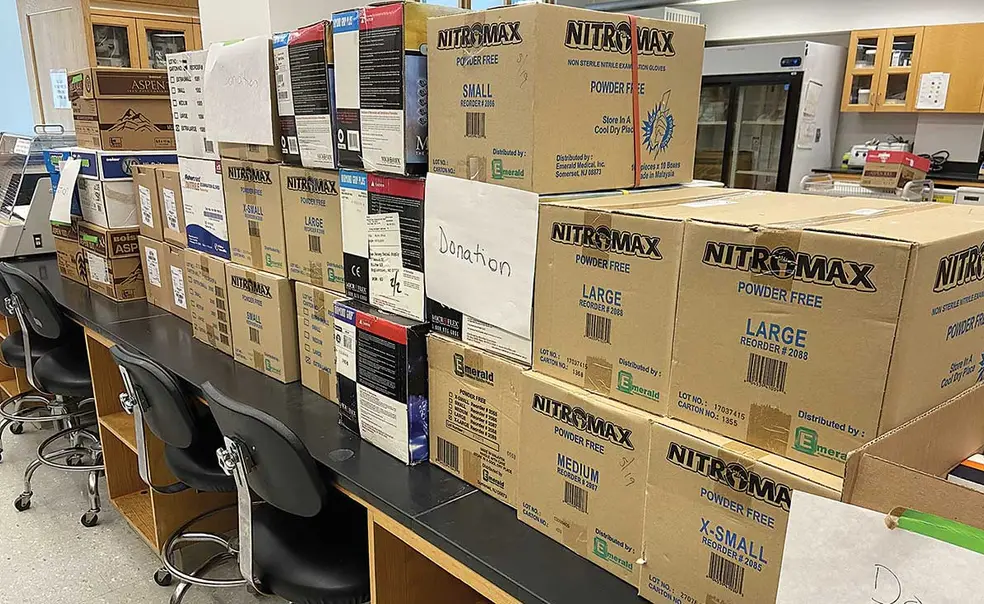Research and Thesis Work Are Cut Short as Most Princeton Labs Shut Down
About 10 percent of the University’s research capacity is still active on campus.
Early in March, as the threat of COVID-19 was becoming clearer, Professor Yibin Kang and his research team — like scholars across campus — began to plan for how they’d shut down their lab if that day came. On March 23, it did.
“When we started discussing [shutting down] two or three weeks ago, it still looked like a remote possibility,” said Kang, a professor of molecular biology. “Then it just came like a tsunami.”
Dean for Research Pablo G. Debenedetti announced in a March 21 email to Princeton’s research community that activities would be suspended by 5 p.m. two days later, to comply with a new stay-at-home order by New Jersey Gov. Phil Murphy.
“In calling for this step, I want to acknowledge the sacrifice that you are making to suspend research activities, whether it is delaying experiments or terminating those in progress,” Debenedetti wrote in the email. “We have not made this decision lightly or without recognition of what it means for researchers at Princeton, including our talented graduate students, postdocs, and other research staff.”
Kang, whose research focuses on mechanisms of breast cancer metastasis and aims to discover therapeutic treatments, said his group acted quickly. In an orderly shutdown, group members powered down equipment, shut down water baths and heaters, and ensured liquid nitrogen was properly stored in the freezers. Kang’s lab group also works with mice, so researchers had to terminate ongoing tumor experiments, reduce the colony size, and create detailed documentation of how to care for the mice of various experiments. Two people from his 30-person lab group were given permission to routinely check on the lab and maintain the mice for everyone.
Researchers in Kang’s group plan to use their time away from the lab to review data, write papers, and read literature for updates in the field. The group, like others, donated all of its protective gear to the state for use by medical professionals.
It takes time to breed the mice to increase numbers and get them on the proper diet, so recovering from the setback will take several months. “We can’t do stop and go,” Kang said. Whenever the lab reopens, researchers will essentially be starting over.
About 10 percent of the University’s research capacity is still active on campus, Debenedetti estimated. Essential research was allowed to continue, including labs that would lose crucial data or the entire experiment, Ph.D. theses that would be lost if interrupted, and those working on COVID-19-related experiments, he said. COVID-19 research proposals were due April 5, and special funding will be available for selected projects. Some research may continue remotely.
“When we started discussing [shutting down] two or three weeks ago, it still looked like a remote possibility. Then it just came like a tsunami.” —Yibin Kang, professor of molecular biology
Psychology graduate student Judith Mildner is continuing to work remotely. She’s a member of the Princeton Social Neuroscience Lab, led by Diana Tamir, which focuses on thoughts, cognitive processes, and behaviors. Mildner has shifted her focus to COVID-19, to research the impact of extended isolation on individuals. Since she cannot use the lab, she created an online survey to collect data.
“We want to get a better understanding of what people’s day-to-day social interactions look like, how these interactions affect people’s well-being, and the extent to which people’s social needs are met,” Mildner said.
Undergraduates also felt the effects of the research shutdown. Chemistry major Sarah Schneider ’20 had been working in Frick Lab on her thesis, which focuses on creating two-dimensional materials and studying their magnetic properties for use in next-generation electronics. Schneider said ending her research was disappointing because she was close to making some major breakthroughs.
Her adviser, Leslie Schoop *15, said Schneider’s study is in good shape, and in her thesis, she can speculate on the part of her research she was unable to complete.
The research of Beimnet Shitaye ’20, a mechanical and aerospace engineering major, came to an end when the machine shop closed. Her team was creating a robot that could dig underground and create an irrigation system for plants. Since it was not complete, team members took photos to show what had been accomplished.
It’s all been very stressful, Shitaye said, because she had viewed her thesis work as the one thing she could hold onto. “I thought, even if all of my friends were going to be leaving campus, even if my roommates would be gone, at least I could stay here and continue to work on this one part of being a senior that I could still accomplish,” she said.










No responses yet